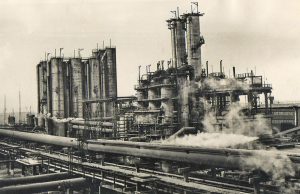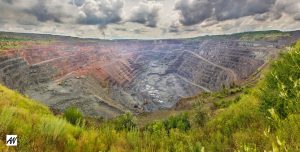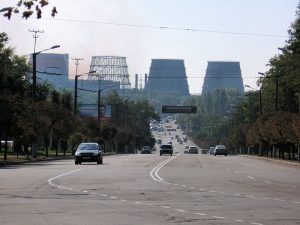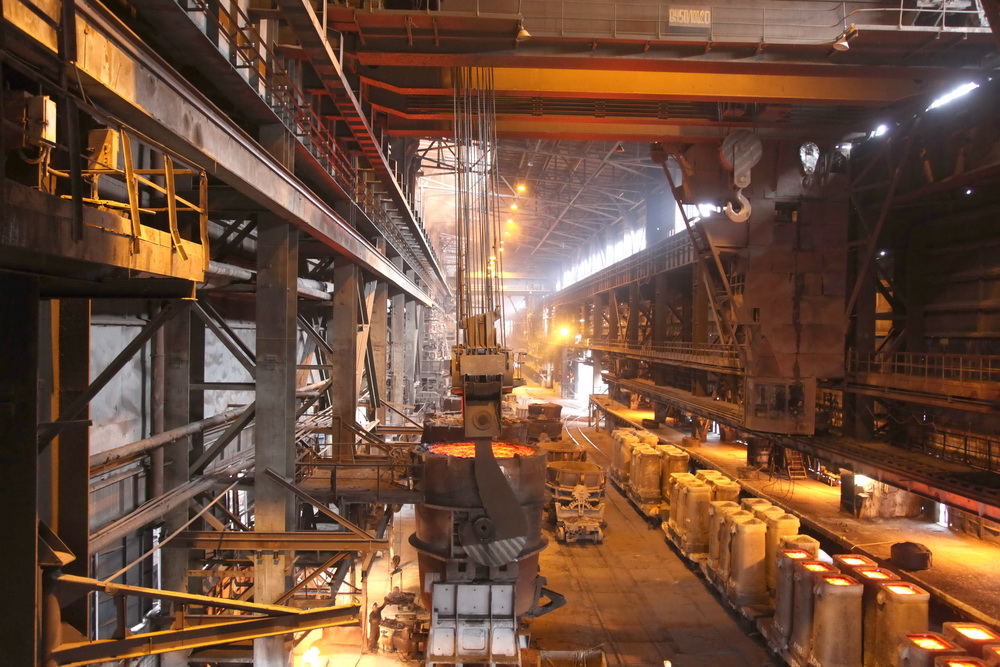Meanwhile, on 12 July at the top the parliamentary election campaign, Zelenskyy visited his hometown of Kryvyi Rih, Dnipropetrovsk Oblast, known for its adverse environmental conditions where he took part in a meeting devoted to town's ecological issues. The president blamed local steelmaker ArcelorMittal Kryvyi Rih (AMKR, a.k.a. Kryvorizhstal) for the pollution and demanded it pays compensation to the locals who suffered allegedly due to bad ecology conditions. The company, Ukraine's largest steel manufacturer and largest foreign investor which invested over $9.2 billion in Ukraine during 13 years, called Zelenskyy's statements eco-populism.
Later the Security Service of Ukraine (SBU) now led by Zelenskyy's crony Ivan Bakanov opened a criminal case under the “ecocide” article against the mill. Further on, the agency came to AMKR with searches and alleged that it "localized" a potential radiation threat to the residents of Kryvyi Rih. The company gave some technical details and said that the SBU misinterpreted the taken measurements and there was nothing beyond the norms.
Acting SBU head Bakanov accused the management of ArcelorMittal Kryvyi Rih of improper use of investments.
In fact, it was the first large case in Ukraine since the times of ex-president Yanukovych, who was swept from power during the Euromaidan revolution, when the security service was used as a political tool to pressure businesses.
Of course, the SBU acting head denies any pressuring.
President going off on the steel mill

ArcelorMittal Kryvyi Rih, the Ukrainian arm of the world's largest steel producer, was founded as Kryvorizhstal back in 1934 and throughout its development in the Soviet times the mill never cared about the dangerous emissions into the air and water it produced, slag heaps it made, and about the harm to the local environment caused by its ore quarries. Mittal Steel, owned by Lakshmi Mittal - an Indian steel magnate based in the United Kingdom - bought Kryvorizhstal back in 2015.
At the 12 July meeting on Kryvyi Rih's ecological issues, president Zelenskyy harshly criticized AMKR, blaming the steelworks of "not carrying out in time the obligations regarding improving the ecological situation in the region." Moreover, the president strongly urged the private enterprise to provide the people who suffered in the last five years allegedly from harmful emissions with targeted financial aid. "I think the city hall can help us find the list of the people who, unfortunately, developed oncological diseases in these years," added Zelenskyy.
"We are talking about financial aid for these people... about a concrete financial apology to these people, I'd like to formulate it right this way," said the president.

AMKR's Deputy CEO Oleksandr Ivanov told at the meeting that in the 13 years of ArcelorMittal's ownership, the enterprises' emissions into the atmosphere were reduced by 48% and wastewater discharges dropped by 80%.
"One can blame us that we didn't implemented six points [of the modernization plan] out of 48, but we plan to invest $1.8bn in the production in the next five years and that would be our environmental measures," told Ivanov.
Zelenskyy reacted with the words, "Why must the number of cancerous illnesses in Kryvyi Rih depend on your strategic plans? You are doing it for people, and you employ the people."
"Eco-populism"
On the same day in the official press release titled "Eco-populism as a trend," AMKR's CEO Paramjit Kahlon stated,
"The mining and metallurgical industry, which makes up one-fifth of export revenues of the country, suffers from pressure during the pre-election period. It is especially vulnerable before politicians who actively use environmental topics for their pre-election promotion."

He reminded that natural resources in the Donbas and Kryvyi Rih iron-ore basin were historically exploited with no regard to the environment and not "dozens but hundreds of millions of tons" of various wastes were just dumped in the open air without any cleansing. Another issue is that the industrial giants were built in the Soviet times just in the cities near the residential neighborhoods or, vice versa, blocks of flats were built near the production sites. And this legacy of Soviet city planning is a problem not only in Kryvyi Rih but also in Mariupol, Zaporizhzhia, Dnipro, Kamianske, and other industrial cities.

The CEO told that at the moment ArcelorMittal took over Kryvorizhstal, none of its 36 main facilities operated in compliance with European or Ukrainian environmental standards. He mentioned various facilities which were modernized or decommissioned over the 13 years, which enabled significant emission reduction.
"However," he argued, "I have doubts that these peculiarities interest the populists. They seem to have some hidden agenda. To achieve this, they use controlled NGOs, media resources, performances with gas masks, scary videos, etc. Regional and city authorities are dragged into these issues indirectly or directly as happens in parliamentary democracy like ours," Paramjit Kahlon said.
The AMKR CEO stressed that a plant can't be rebuilt within one day and shutting down the plant for several years to build new environmental facilities would leave dozens of thousands of workers without salaries.
SBU comes into play
On 17 July, a few days after the verbal confrontation between Volodymyr Zelenskyy and AMRK's managers, SBU published a post on its Facebook page, stating that its operatives "exposed in Kryvyi Rih officials of a public joint-stock company of unlawful activities regarding the environmental pollution."
The post stated, "according to preliminary data" these people violated the norms of environmental safety and, "systematically," denied admittance of the state environment inspectors, who intended to measure the toxic emissions into the air, to the premises of the plant. Since such unlawful activities "can threaten the environmental situation in the city and safety of its residents," SBU opened criminal proceedings under Article 441 of the Criminal Code of Ukraine (“Ecocide”).
The Code defines ecocide as "mass destruction of flora and fauna, poisoning of air or water resources, as well as other actions that could cause an ecological disaster." It is the only environment-related criminal article in the jurisdiction of the SBU.

The AMKR reacted to the Facebook post with a press release, in which they assured their readiness to cooperate with the agency according to the legislation and underlined that the steel mill operates according to all environmental standards stipulated by the state. Moreover, the company states that it impacts the environment much less than other metallurgical plants in Ukraine, though no mining or metallurgical company was charged with ecocide before.
"We hope that the increased attention to our enterprise by the government, various political forces and the initiation of a criminal case by the SBU under quite a rare clause on the eve of the elections, is a random coincidence and does not indicate on targeted influence on business," concludes the press release.
The company denied the accusations repeated by SBU that AMKR denied admission of controlling authorities for years calling such statements "a manipulation." The latest unscheduled official inspection took place in April 2019.
SBU referred to unofficial inspections which local activists with councilors and regional inspectors tried to conduct several times.
As well as the company stated that no “financial excuse” – compensation to the residents of Kryvyi Rih demanded by Zelenskyy – was negotiated at the meeting of its top management with regional authorities on 19 July.
Radiation search and cry for help
On 20 July at 10:00, the eve of the parliamentary elections, SBU came with a search to ArcelorMittal Kryvyi Rih. The inspection group included representatives of the State Emergency Service and the State Nuclear Regulatory Inspectorate of Ukraine. The group inspected a brand-new facility - continuous billet casting machine No.3 - for many hours, the subject of its interest was industrial detectors which using ion radiation, and, as the company states, the operatives confiscated all manufacturing documentation related to the facility and left the premises only late at night, at 3:00.
The company said that such actions are jeopardizing the future of the plant and its 29,000 employees, and urged the international community to help,
"We ask for support from our partners and international organizations. We call on the embassies of the G-7, the European Business Association, the American Chamber of Commerce, Ukrmetalurgprom, the Metallurgists Federation of Ukraine and other organizations to pay attention to this situation and to help ensure constructive cooperation between international business and government," the statement reads.
SBU's version
On the next day, acting Head of the SBU Ivan Bakanov said that the SBU operatives localized the potential threat of radiation spread in Kryvy Rih and that the investigative actions at the facility were part of criminal proceedings under the ecocide case.
“I’m sure that Lakshmi Mittal, who is a powerful international investor, while trying to make this investment… didn’t plan to do anything wrong. But the management working at the enterprise neglected their duties. And therefore they should suffer at least disciplinary sanctions,” Bakanov speculated.
He clarified that, most likely, the matter will not even concern administrative responsibility, not to mention criminal charges.
“It was not pressure [on the company] for sure,” the acting security service chief assured.
Ihor Yena, chief of the SBU investigative department in Dnipropetrovsk Oblast, told a briefing in Kyiv that SBU received information that radiation safety requirements were violated at a continuous casting machine during the adjustment and start-up operations.
"At the scene during measurements we discovered radiation which far exceeds the permissible sanitary norms for working at this enterprise. That's 4.4 microsieverts per hour. It was fixed during the procedural actions. Besides that, [plant] employees obstructed [the operatives] to inspect of the equipment," told Mr. Yena.
Meanwhile, a day before, ArcelorMittal Kryvyi Rih published their version of the events stating that when the investigators measured the level of radiation at the distance of 10 cm from the surface of the lid of the mold, it comprised 0.15 microsieverts per hour - the indicator was in line with the norm. According to AMRK, all equipment corresponds to EU norms and is similar to the one used at the European assets of the company.
After the SBU briefing, the steel mill explained that the 4.4 μSv/hour reading, which "far exceeds the norm" according to Yena, is the maximum permissible according to safety requirements. Moreover, the protocol also shows that this particular measurement was made after the safety metal lid was removed from the container with the source of ion radiation.
The security agency banned management from using the equipment and the facility where it is located and the plant’s acting head Oleksandr Ivanov says that the steel mill will lose $1 million this month after the piece of steelmaking equipment was seized.
Concern
Andy Hunder, the President of the American Chamber of Commerce (ACC) in Ukraine reacted to the SBU search at ArcelorMittal Kryvyi Rih with the words,
“Discouraging news from Ukraine’s top investor that has invested over $9 billion in Ukraine. Investors will be concerned about selective justice.”
He called it a "wrong message to the investment community" from Ukraine.
The executive director of the European Business Association (EBA), Anna Derevyanko, said that the situation around ArcelorMittal Kryvyi Rih is another signal that the necessity of the law enforcement reform is "overripe." The event worried business and the issue was discussed at the meeting of the National Investment Council on 22 July.
Head of the EU delegation to Ukraine Hugues Mingarelli commented on the situation in his interview with Ukrainska Pravda. He said that SBU raids on commercial companies are already harming Ukraine's investment attractiveness.
"Of course, there is a need to fight corruption in the steel industry as well. But is the situation at ArcelorMittal the worst in Ukraine? I am not an expert and have no answer, but when I was in Mariupol [a front-line city in the Donbas, where another steel giant, Azovstal, is located] and slid my finger on a [window] glass, the finger turned black. And I know for sure that it was not ArcelorMittal's pollution but probably Metinvest's," Mingarelli said, "In general, it is somewhat strange to see the Security Service of Ukraine in such matters, and we were all surprised by it."
A few days after the search at ArcelorMittal Kryvyi Rih, the National Anti-Corruption Bureau of Ukraine conducted a search at Kyiv-Based Bohdan Motors Automobile Company in a case connected to a load of a state-owned bank. The company said that the raid's nature was political and it threatened the performance of contractual obligations. The same agency conducted another search at the plant just several days before, on 19 July, and both raids paralyzed the managing company's operations, according to Bohdan Motors.
Bohdan Motors informed the G7 ambassadors and EBA of the NABU's "politically motivated actions" intended to create an impression that the company uses "non-existent corruption schemes."
Read also:
- Zelenskyy to form mono coalition and other takeaways of Ukrainian elections
- Zelenskyy’s consolidation of power: a chance for change or authoritarianism?
- When violation of law does not prevent from victory, Kryvyi Rih election example
- Oligarchic shadow of Ukraine’s 2019 elections

